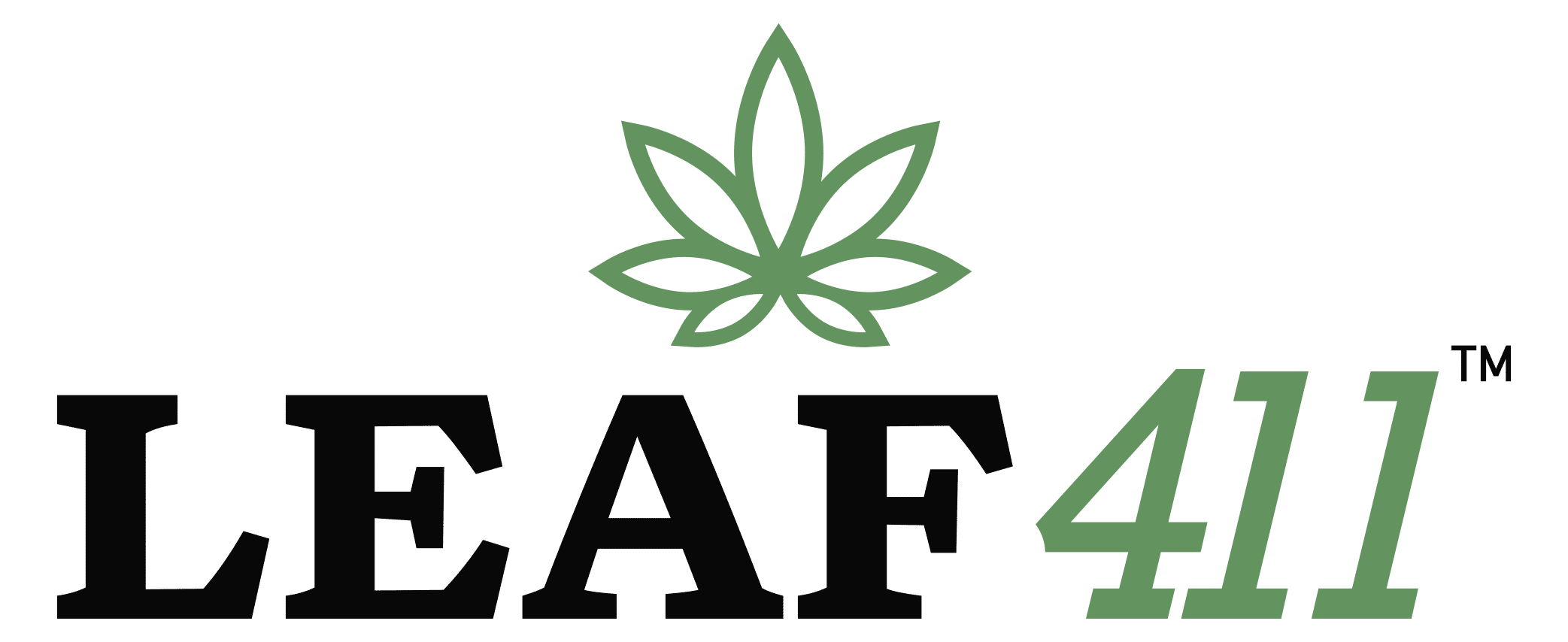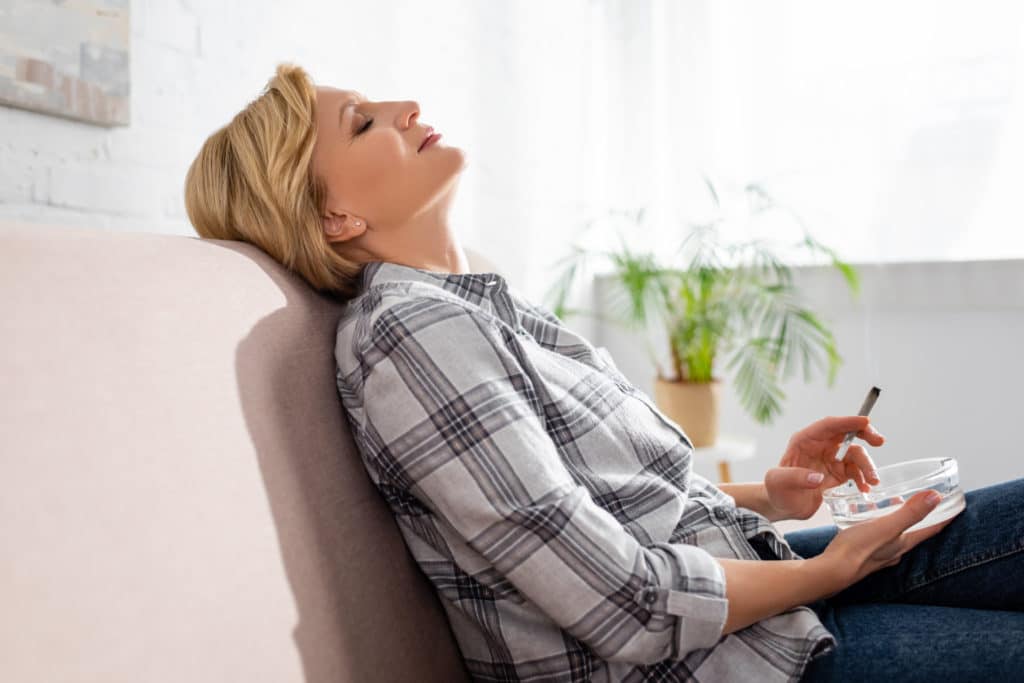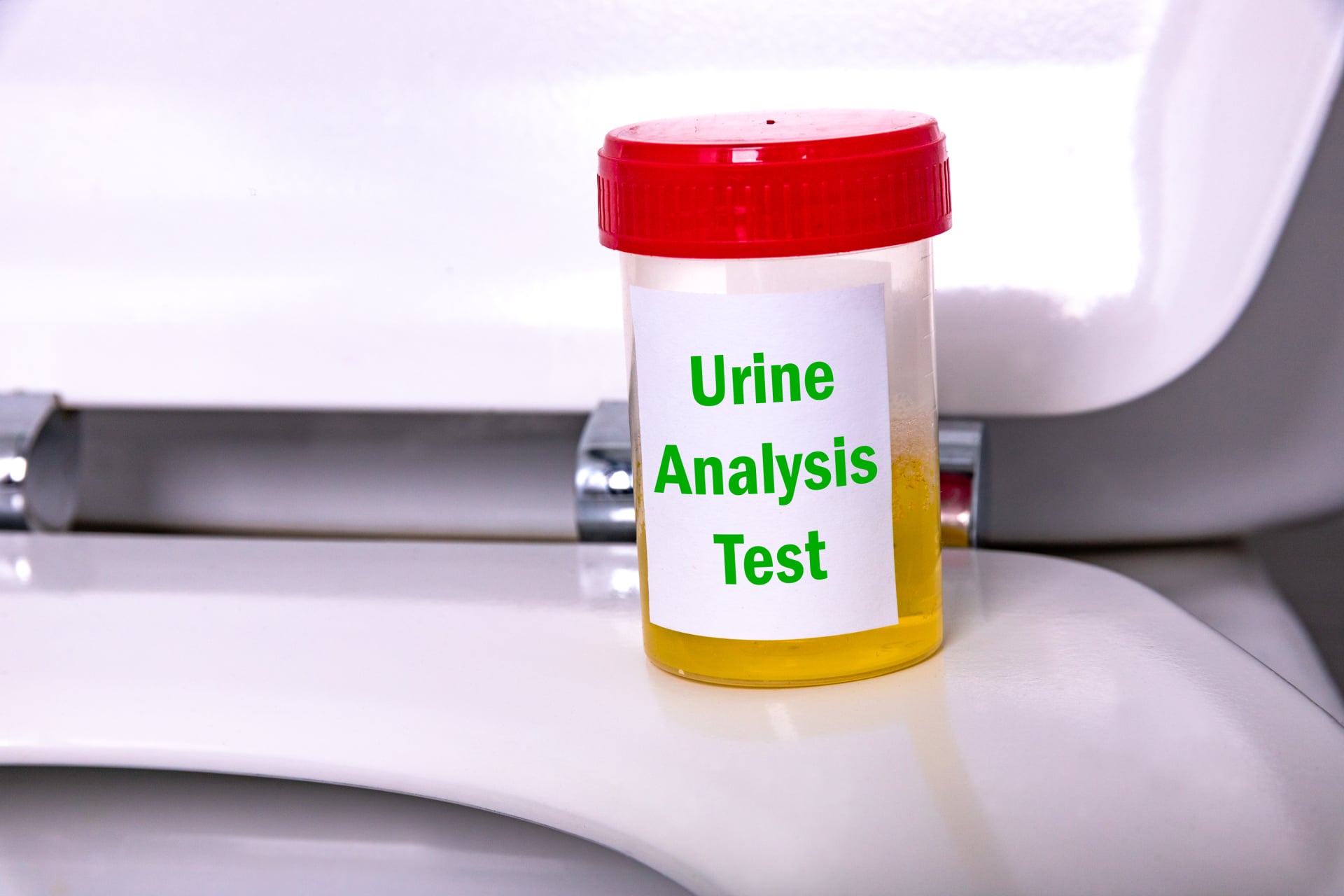Finding Low-THC Cannabis Strains
Low-THC cannabis can be a powerful option for relaxation and relief
Medically reviewed by Katherine Golden, RN
Written by Denise Rustning
Many mature cannabis consumers wax poetic about the old days when they could smoke an entire joint for relaxation without ending up too high.
Yet as states legalize cannabis, cultivators have prioritized breeding high-THC strains that can quickly intoxicate a user with just a few puffs. Not everyone is looking for the intense “high” that these high-THC strains often deliver, though.
Additionally, low-THC cannabis flower strains allow users to consume more of the other beneficial plant compounds, including terpenes and plant flavonoids, without going overboard on THC. While some patients do need high-THC products, we’ve found that many people achieve maximum relief with minimum intoxication when using lower-THC products, based on the caller feedback we receive at Leaf411.
How do you find low-THC strains in a marketplace that prioritizes high-THC flower? We were thrilled to see our Leaf411 business member Where’s Weed tackle this question on their blog, including recommended low-THC strains along with a search feature to find these strains near you.
Click here to read the Where’s Weed’s article, 5 Low THC Strains You Should Try.
To know exactly what you are purchasing, always ask the budtender about the product’s test results showing the cannabinoid potency. Why is that?
Even though a specific strain’s name (like Blue Dream) may be the same from one dispensary to another, the plant’s genetic structure along with the environment in which it is grown defines its final form. A plant with similar genetic makeup, when grown in a different environment (for example, in a different region or under different greenhouse conditions) will bring out a different trait from the plant’s genetic code resulting in a unique color, shape, smell and resin production.
Remember, too, that our cannabis-trained nurses can help with any questions you have about cannabis potency or use. Call the FREE Leaf411 hotline at 844-LEAF411 (844-532-3411) or chat with us from our home page during hotline hours, Monday-Friday from 8:00 a.m. to 7:00 p.m. MDT.
The Leaf411 cannabis nurse hotline provides free, anonymous education and directional support to the general public about the safe use of legal cannabis. We partner with select business members who meet our rigorous standards to extend our education and outreach efforts.
An Insider’s View on Washington D.C.’s Best Medical Cannabis Dispensary

Medically reviewed by Katherine Golden, RN, and Eloise Theisen, NP
Written by Denise Rustning
We recently caught up with Stephanie Kahn, BSN, for her perspective as a cannabis nurse and Takoma Wellness Center medical dispensary co-founder. Stephanie shared her insights from leading Washington, D.C.’s longest running legal medical dispensary and what she wished every new cannabis patient knew before visiting a dispensary.
(Note: This blog post was edited on 9/9/21 to more accurately reflect Washington, D.C., cannabis regulations.)
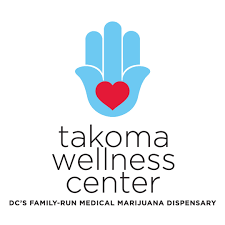
Step into Leaf411 member Takoma Wellness Center medical cannabis dispensary in Washington, D.C., and the first thing you’ll notice is the hamsa, a hand-shaped design that is believed to offer protection and good fortune, that traces back to ancient Mesopotamia.
The hamsa symbol is fitting, given that it shares a long history that runs parallel with cannabis. The cannabis plant can also be tracked back thousands of years ago when it was used medicinally, including in Mesopotamia. The hamsa symbol also holds an important place in the Jewish culture shared by founders Stephanie Kahn, BSN, Rabbi Jeffrey Kahn and their son Joshua Kahn.

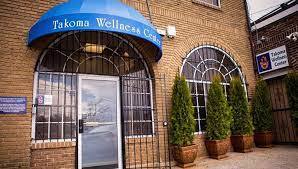
With a background in healthcare and the spiritual community, the Kahns already had extensive experience helping patients before entering the cannabis industry. One cannot help but think of Takoma Wellness Center’s extensive hamsa collection as a symbol of their caring and hope for the patients who visit the store.
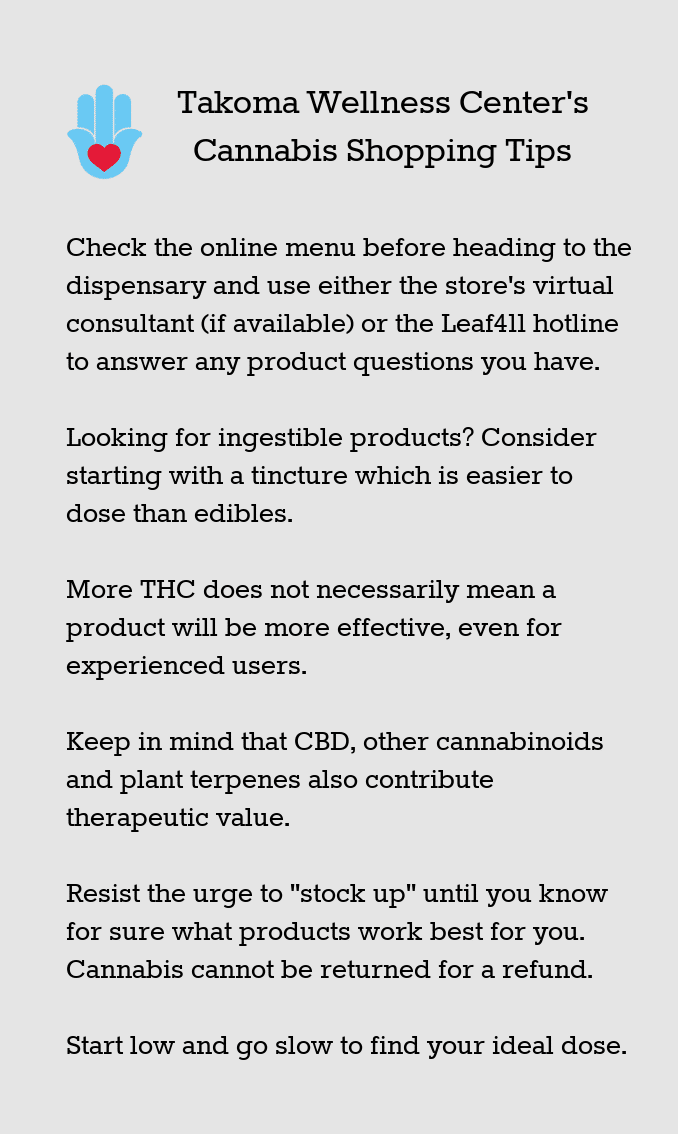
Navigating Washington, D.C.’s unique cannabis landscape
Takoma Wellness Center holds a unique spot as the oldest and longest running legal medical dispensary in Washington, D.C. While cannabis remains illegal at the federal level, the plant is legally sold for medical use in the nation’s capital, and possession of small amounts for personal use has been decriminalized.
District residents also support adult use (recreational) cannabis; however, Washington, D.C., is unique in that it’s not a state but a district that is ultimately governed by the US Congress. So far, Congress has blocked the district’s efforts to create a legal adult use cannabis marketplace.
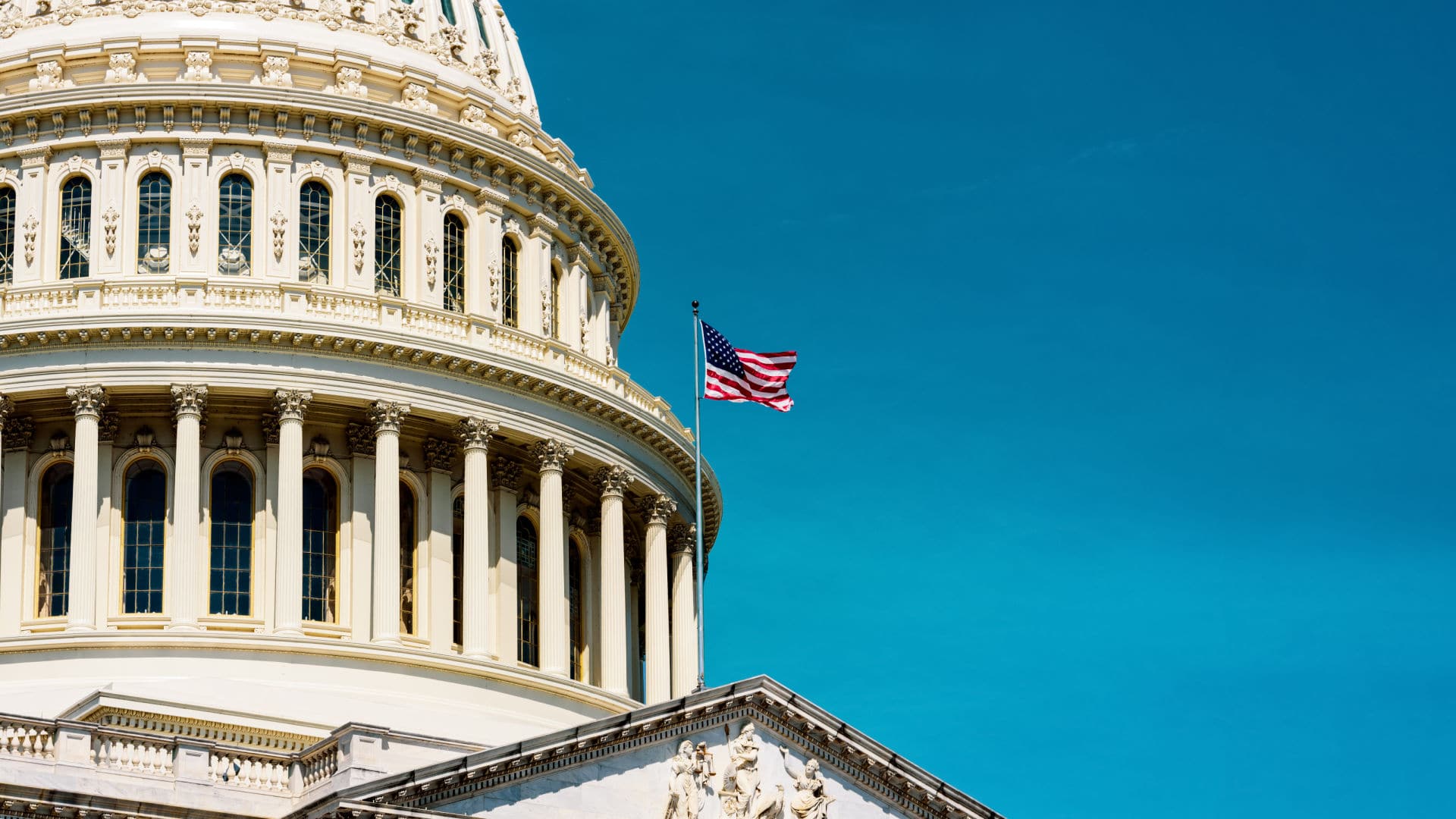
District of Columbia dispensary Takoma Wellness Center accepts out-of-state MMJ cards
Cannabis cannot cross state lines, but marijuana medical cards can in a few states as well as in Washington, D.C. Medical dispensaries in the district accept valid medical cards from any state with a legal medical cannabis program, when that person is visiting the district and buying medicine in-person. (Dispensaries are not allowed to deliver or ship product across state lines due to ongoing federal prohibition that regulates all interstate commerce.)
For Takoma Wellness Center which is located only a few blocks from the Maryland state line and approximately 10 miles from Virginia, this means that over 50% of their customers come from outside the district, mostly from neighboring states. As nearby state marketplaces evolve, however, the mix of patients continues to change.
“We used to get a lot of patients from New Jersey and Pennsylvania, but as their own state programs have improved, there’s less need for their residents to travel to find cannabis medicine that works for their needs,” Stephanie says.
Of course, the capital is also a popular place for people from around the country to visit. For patients who are unable to bring their cannabis medicine with them when traveling, finding a trustworthy local source like Takoma Wellness Center can be a godsend.
Building a medical dispensary around the needs of cannabis patients
Takoma Wellness Center was built around not only providing a wide range of products but also exceptional service to patients, with patient consultants (similar to budtenders) who spend time educating visitors on different options. That commitment has remained even during pandemic challenges.
“Prior to the pandemic, we would spend a lot of time with our patients. That all changed last year with restrictions and the need for social distancing,” Stephanie says.
“A lot of the changes were positive. We were allowed to implement online ordering, curbside service and delivery. The downside, though, was that we were not able to spend the same amount of time in store consulting with patients.”
In response, Takoma Wellness Center developed virtual consults and protocols for patients to check in outside, reducing the time most people needed to spend inside the store. Stephanie says that their relationship with Leaf411 has also helped, with Leaf hotline nurses who are able to guide patients on the phone while looking over Takoma Wellness Center’s extensive online menu.

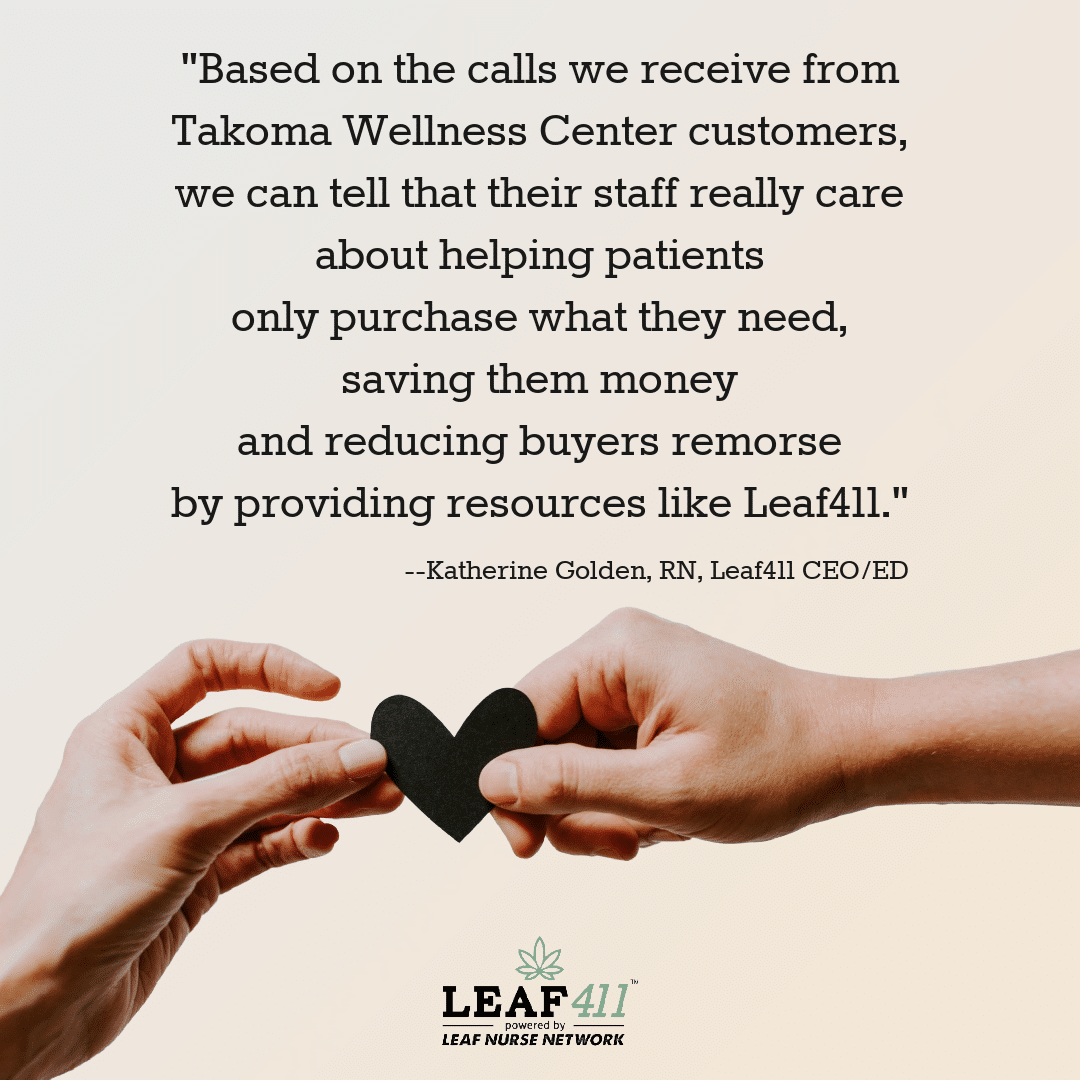
What are the top reasons patients turn to medical cannabis?
Takoma Wellness Center serves patients who are seeking alternatives for a wide range of conditions.
“Pain and anxiety top the list, when it comes to the information that patients share with us. We have patients visiting us who have autoimmune diseases, multiple sclerosis (MS), Lyme disease, Ehlers-Danlos syndrome, fibromyalgia, cancer pain and chemo side effects, who are seeking relief,” Stephanie says.
“We also have a couple of pain doctors in the area who are suggesting cannabis as an alternative to opioids for some of their patients. In my mind, this is a very positive development,” Stephanie says, though she also acknowledges that many other pain clinics continue testing patients for THC, with positive THC tests disqualifying them from continuing with prescription-based pain medications.
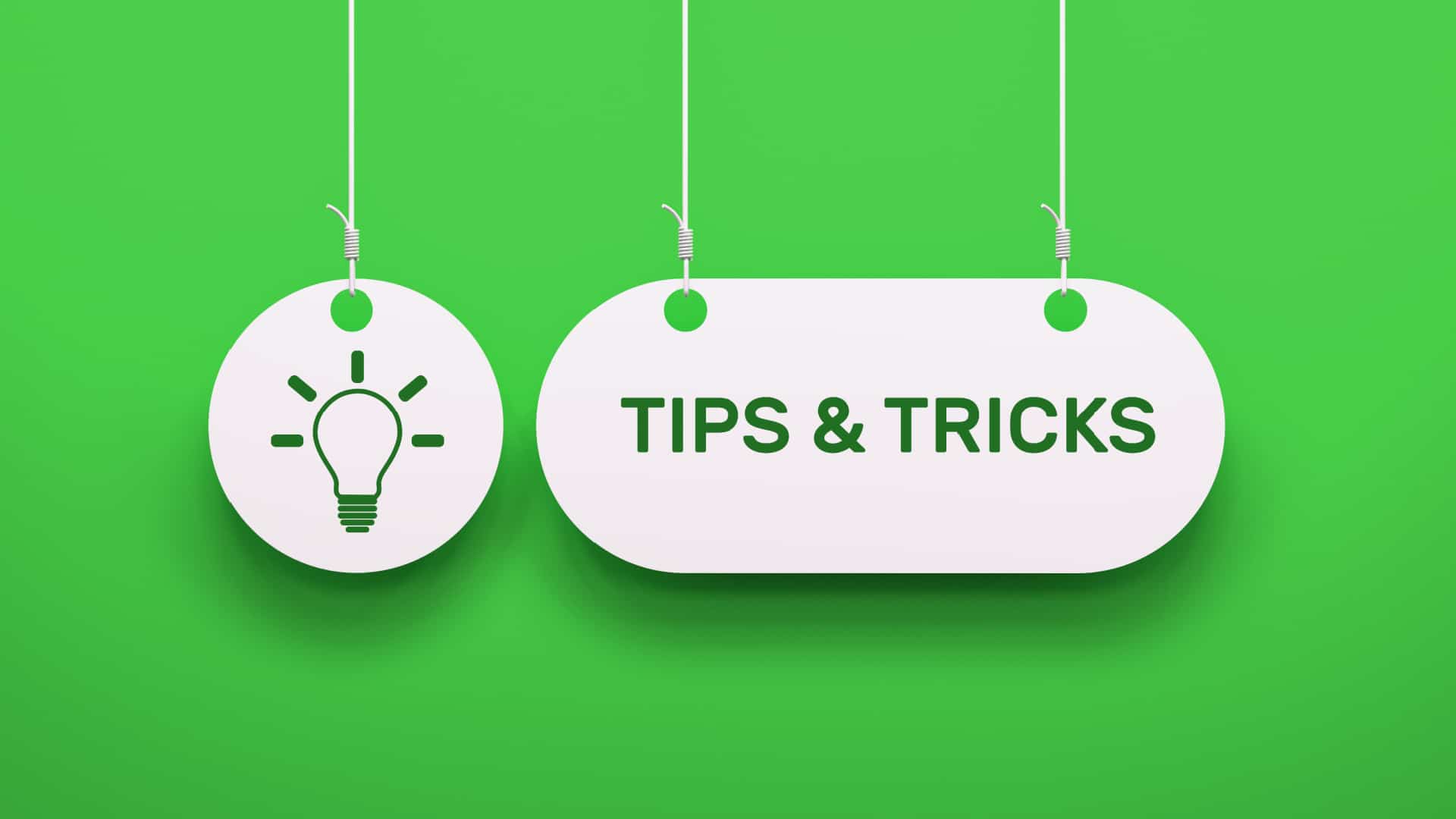
Advice for both new and experienced cannabis patients
Stephanie has spent years helping patients understand the ever-changing cannabis landscape, with Takoma Wellness Center’s product selection informed both by Stephanie’s cannabis nursing background and years of experience hearing from patients on what has worked best. She’s also seen common missteps that new patients make on their first dispensary visit and has some general advice to share.
“A lot of cannabis naïve patients come in wanting to try edibles first. However, we really encourage them to first try tinctures instead. It’s much easier to adjust your dose with tinctures, which is especially important if you’re starting low and going slow,” Stephanie says.
She also sees both new and experienced cannabis users missing out on the full potential of plant medicine when they only focus on finding the highest-THC products.
“Whether the patient has been buying on the street for 30 years or they’re new to cannabis, we often see them looking for the highest THC product when a ratio product containing a balance of THC and CBD might actually provide better relief,” Stephanie says. “Obviously we’re not going to force education on them, but we do encourage patients to explore different product types and often have discounts to make it easier to try new things.”
When trying new products, Stephanie suggests that patients resist the urge to “stock up,” since cannabis products cannot be returned to the store.
“We’ve had customers who are brand new to cannabis who want to buy a half-ounce of cannabis flower or an extra-strength tincture because they believe it will be better than regular strength. While we’re not going to deny them that purchase, we do try to educate them and explain what the problems they might encounter,” Stephanie says.
Stephanie as well as Takoma Wellness Center staff also suggest that patients start low and go slow, understanding that everyone’s endocannabinoid system is different.
“The dose that works best for your friend may either be not enough or way too much for you. The best way to find your ideal dose is to start low and go slow, building up to the dose that works for you,” Stephanie says.
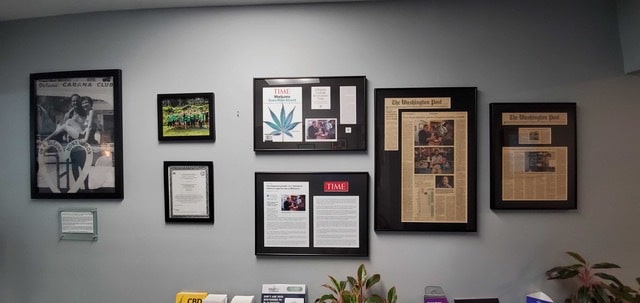
Looking for the best local, family-owned D.C. dispensary with deep ties to the area?
Today’s patients and consumers have more options than ever when it comes to shopping for cannabis medicine. Many are eager to support local businesses that are making a difference and building a sustainable, equitable cannabis industry.
Takoma Wellness Center’s ties to the community run deep. Both of Stephanie’s parents grew up in Washington, D.C. within blocks of the medical dispensary’s current location. It was her parents’ experience using cannabis on doctors’ recommendations that inspired the Kahns to open a medical dispensary. As Stephanie says, “The story of medical cannabis in our city is personal to us—it’s also our family story.” (Read more about their story here.)
Stephanie is humble when it comes to ways the dispensary reinvests in the community. When asked, she shares that Takoma Wellness Center hires from the community, offering full health benefits, paid time off and above minimum wage pay. The dispensary has also participated in National Expungement Week and supports various community groups and programs.
Takoma Wellness Center has earned Washington City Paper’s Best of D.C. Best Dispensary award for five consecutive years thanks to its commitment to patients and the community, as well as its vast product selection.
Also, as a Leaf411 business member, Takoma Wellness Center also helps ensure that cannabis education is freely available to all patients, regardless of where they live.
Katherine Golden, Leaf411 founder and CEO/ED says, “Based on the calls we receive from Takoma Wellness Center customers, we can tell that their staff really care about helping patients only purchase what they need, saving them money and reducing buyers remorse by providing resources like Leaf411.”
Check our fully-vetted Leaf member directory for the best cannabis stores and brands
Thousands of cannabis brands compete for your attention and dollars. How do you sort through all the options to find incredible businesses like Takoma Wellness Center? We suggest starting with our Leaf Member Directory located under our Resources tab on our home page, to find cannabis and hemp CBD companies located throughout the United States. We carefully review all our supporting members and are confident in referring members of the public, our callers, friends and family members to these businesses.
Remember that the non-profit Leaf411 is a resource available at no cost to you, the public. Whether you would like help understanding an online dispensary menu, or have questions about product dosing or potential interactions with other medications, our cannabis-trained nurses can help. Call the Leaf411 hotline at 844-LEAF411 (844-532-3411) or chat us from our home page during hotline hours, Monday-Friday from 8:00 a.m. to 7:00 p.m. MDT.
The Leaf411 cannabis nurse hotline provides free, anonymous education and directional support to the general public about the safe use of legal cannabis. We partner with select business members who meet our rigorous standards to extend our education and outreach efforts.
CBD and Workplace Drug Testing
Can hemp CBD make you fail a drug test? It depends.
Medically reviewed by Katherine Golden, RN, and Eloise Theisen, NP
Written by Denise Rustning
Our Leaf nurses recently heard from several upset callers who unknowingly tested positive for THC on workplace drug tests, despite limiting their use to hemp CBD products. How did this happen? What can you do to reduce your risk of failing a drug test as a result of legal CBD use?
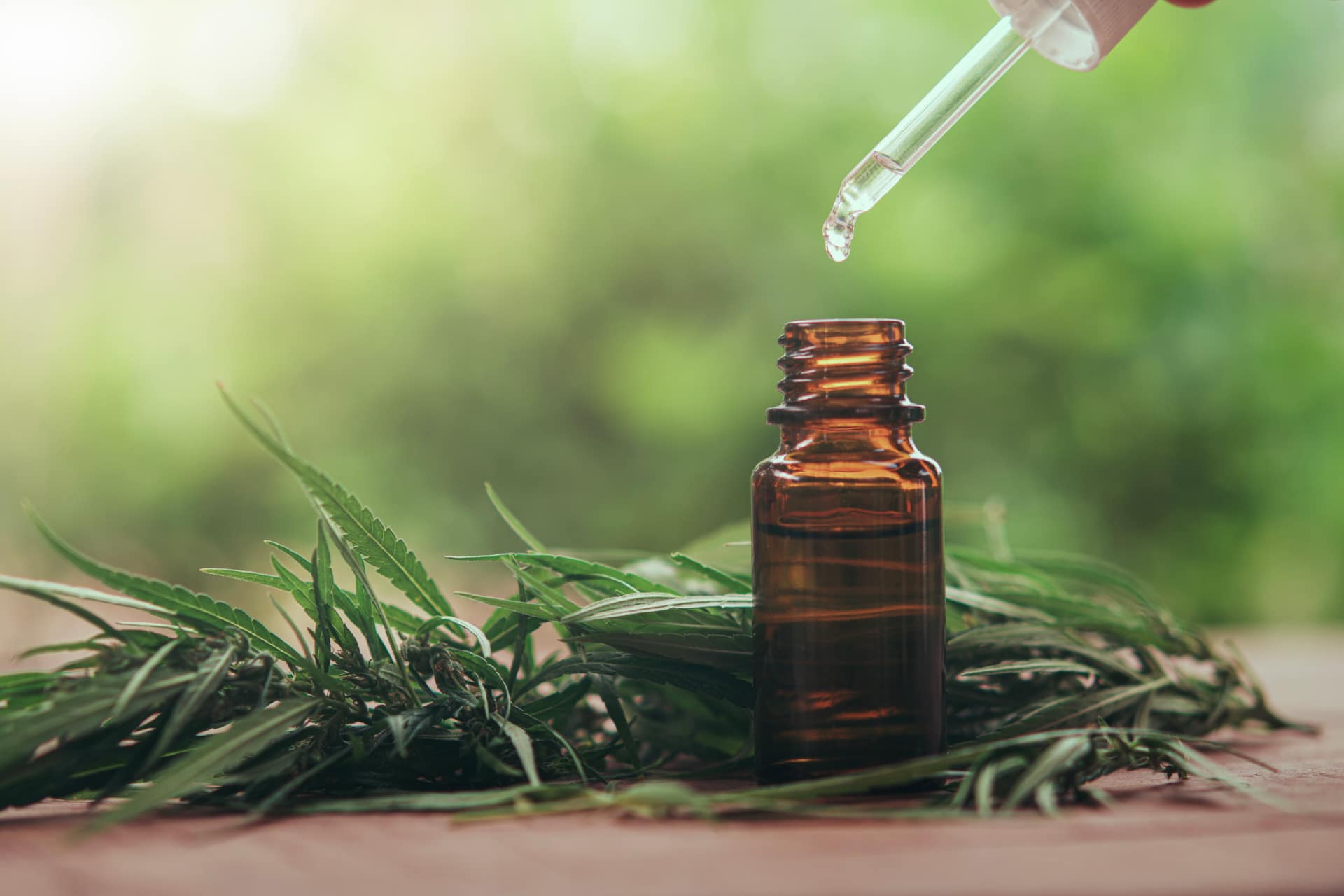
Natural hemp contains trace amounts of THC
Hemp is actually a form of cannabis that has been cultivated for specific characteristics, including high levels of cannabidiol (CBD) as well as very low levels of Delta-9 tetrahydrocannabinol (THC). Federal law requires legal hemp plants to test at under 0.3% THC on a dry weight basis. This hemp plant matter is then used to make the CBD tinctures, gummies, creams and other products that many of us rely upon for wellness and relief.
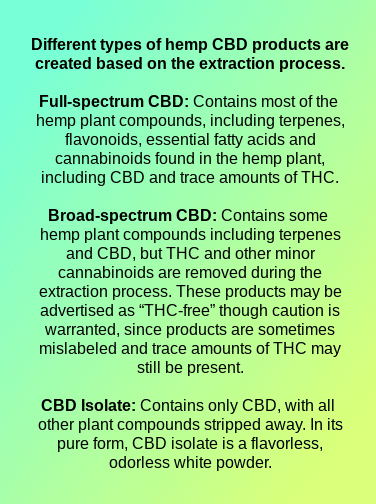
How much THC are you really getting in your hemp CBD?
The product you are taking may meet the legal limit for a hemp CBD product because it registers at 0.3% dry weight of THC. But after processing and packaging, the amount of THC per milliliter may exceed that amount.
Our Leaf nurses have seen many products on the hemp CBD market that are over 1-2 milligrams of THC per milliliter (1 milliliter is typically one dropper full).
Unfortunately many consumers may start off consuming 1-2 droppers full of full-spectrum hemp instead of a lower dose due to limited education when they purchased the product. As a result, they may unknowingly test positive on a drug screen because they are actually consuming 1-2 milligrams of THC on a regular basis.
Wouldn’t a consumer feel it if they were ingesting a couple of milligrams of THC? Sometimes yes and that’s why we have callers complaining that a CBD hemp product made them “high.” Not everyone will feel this type of effect, though, due to the low dose and fact that CBD impacts how THC is absorbed when both are taken together.
How to read a hemp CBD Certificate of Analysis (COA)
You may be wondering about the hemp products in your own cabinet, wondering where you can find information on the amount of THC in your full-spectrum CBD. The best place to look is the product’s Certificate of Analysis (COA) showing lab results from third-party testing.
- The amount of THC (milligrams per gram or “mg/g”) number is typically the last row on the right hand side (see example below).
- This number, mg/g, is approximately the same as milligrams per milliliter–in other words, the amount of THC that you will get per each milliliter (mL) dropperful. (Visit this article to learn more about volume conversion between different cannabis products.)
- Looking at the example COA below, you would expect to get about 0.4 mg of THC in each dropperful of the hemp tincture that was tested.

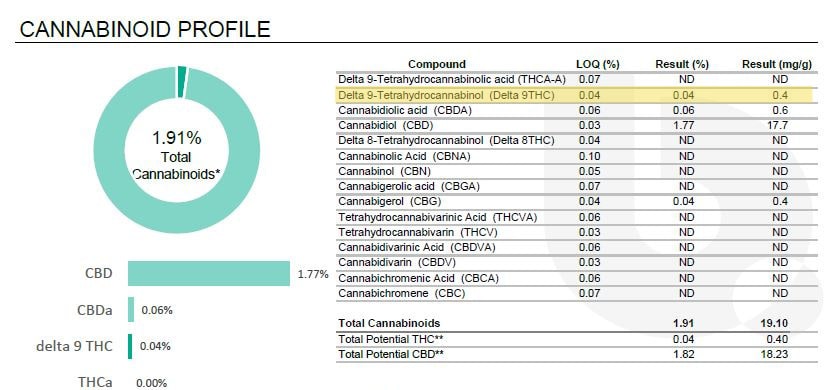
Screenshot from a third-party testing lab Certificate of Analysis (COA) for Elixinol’s Everyday Daily Balance Full-Spectrum CBD Tincture, showing CBD content as well as trace amounts of Delta-9 THC and other minor cannabinoids.
Understanding how much THC is really in your hemp is one part of the puzzle when it comes to potential drug testing. Another clue can be found in how those small amounts of THC are stored in your body, building up over time, when assessing whether your hemp use puts you at risk of failing a workplace drug test.
Leaf411 understands how complicated understanding medical formulations can be and that’s where our hotline nurses can help! If you have your COA in hand, our nurses will do the math for you and figure out the amount of THC you are taking with each dose. Call 844-LEAF411 (844-532-3411) or chat us from our home page during hotline hours, Monday-Friday from 8:00 a.m. to 7:00 p.m. MDT for help in understanding COAs and hemp CBD dosing, at no cost to you.
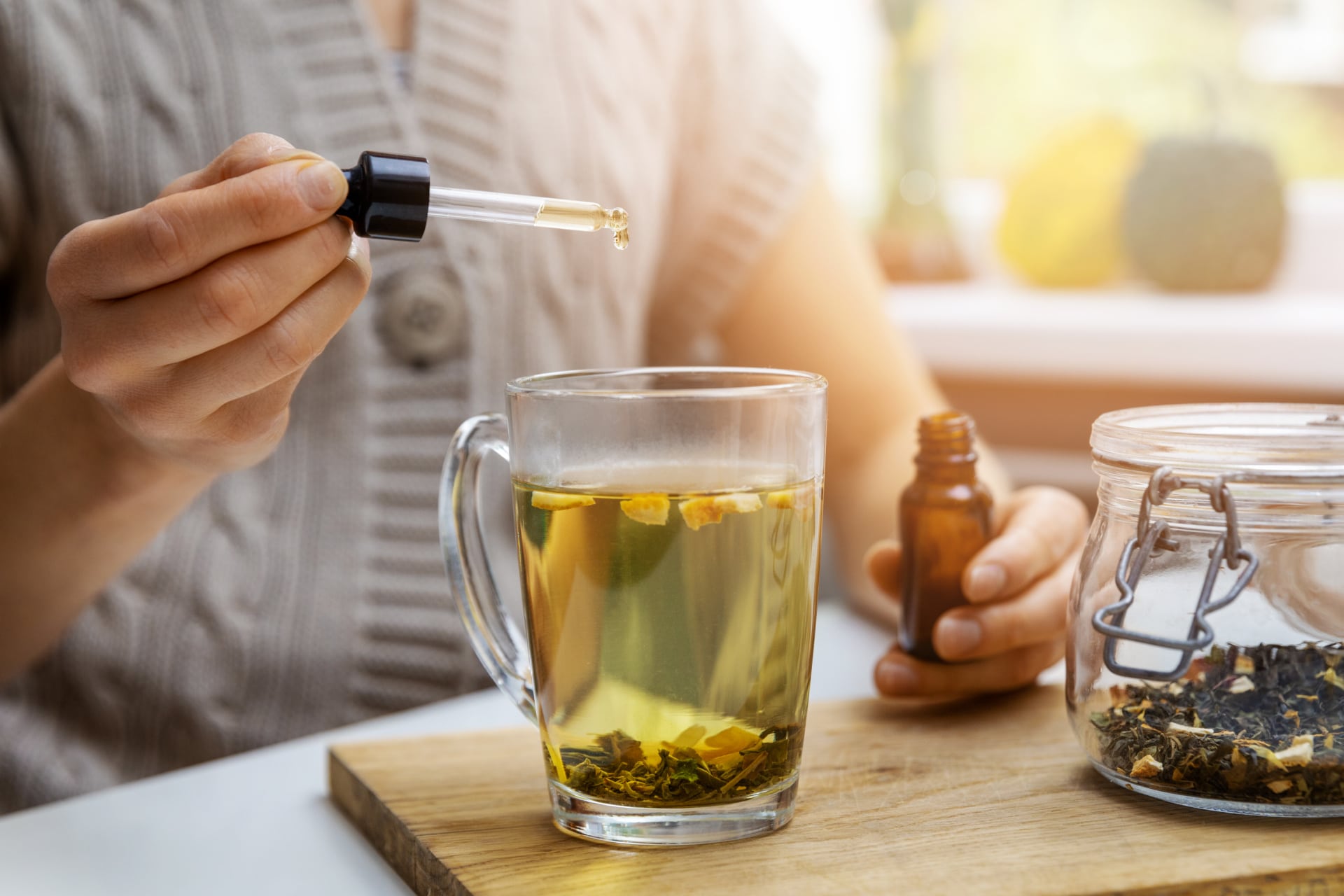
Understanding how THC is stored in the body
Many people prefer full-spectrum hemp CBD, finding it provides better quality symptom management for them than broad-spectrum or CBD isolate products.
With full-spectrum CBD, different plant compounds including minor cannabinoids and small amounts of Delta-9 THC are believed to work together to create an entourage effect. In other words, all the plant compounds working together have a stronger effect than any one compound would have by itself.
THC levels in full-spectrum hemp CBD products are low. However, they can pose potential risks when it comes to workplace drug testing.
Why is that?
When you ingest full-spectrum hemp either orally or through inhalation (smoking or vaping), the trace amounts of Delta-9 THC breaks down into non-active metabolites (THC-COOH) that stay in your system for days or even weeks. While these non-active metabolites don’t make you “high,” they are the markers of cannabis use that urine drug tests look for as evidence of previous cannabis use.
These THC-COOH metabolites accumulate or build up in your system over time, stored in fat cells until they are more slowly excreted, showing up in urine and saliva.
As we just mentioned, this buildup of THC-COOH does not cause intoxication or any other side effects, and is not a problem for most people–unless they are subject to drug testing.
In fact, the American Cannabis Nurses Association (ACNA) has come out against urine-based workplace drug testing due to the fact these tests are unreliable and do not accurately measure on-the-job impairment, with positive test results negatively impacting nurses and other workers who use hemp CBD and cannabis responsibly and legally while off the clock. Click on this link to download the full ACNA resolution regarding workplace drug testing of nurses for cannabis.
Do small amounts of THC from full-spectrum hemp build up to a detectable level?
Unfortunately, research is sparse on how small amounts of THC-COOH metabolites accumulate in full-spectrum hemp CBD users.
In regular cannabis users consuming higher-THC products, we know that these THC-COOH metabolites can stick around for up to a month following discontinuation of daily marijuana use, based on research.
We can also assume that even though the amount of THC in full-spectrum hemp is very small, it will accumulate in daily hemp users the same way that larger amounts accumulate in marijuana users, stored in fat cells with levels of THC-COOH increasing over time.
This is one plausible explanation for recent calls our hotline has received from daily hemp users who failed workplace drug tests based on the levels of the THC-COOH metabolite in their urine, even though they were using an average daily dose of full-spectrum CBD. We’ll discuss what amounts of THC-COOH the drug tests look for further down in this blog post.
Also, it is important to note that workplace drug tests look for evidence of Delta-9 THC, not other cannabinoids like CBD, CBN, or even hemp-derived Delta-8 THC which is created through a chemical process. (Learn more about Delta-8 here https://leaf411.org/answering-your-delta-8-questions/.)


Hemp CBD product quality matters
When investigating why hemp users may fail workplace drug tests, another potential issue comes up as well—product quality.
The hemp CBD product market is largely unregulated for now, putting the onus on the consumer to research product quality and trustworthiness.
The most powerful tool available to a consumer is the product Certificate of Analysis (COA) from a third-party laboratory (i.e. the product is not tested by the company itself); however, lab testing and COAs are completely voluntary for hemp manufacturers, and hemp lab testing technology lacks precision when it comes to very small amounts of cannabinoids when compared to drug testing technology. (To learn more about COAs, what they show and how to read them, we suggest checking out the article and video at this link.)
You can usually find product COAs on the manufacturer’s website, checking them out before you purchase a product.
We took a quick look at some of our Leaf411 hemp CBD members’ sites, and found that links to the COAs may be found either on the top menu or on the bottom of the main website, as well as on product pages themselves. You can also directly contact a manufacturer to request the COA for a particular product. If they don’t offer COAs, it might be best to keep looking for a different brand that does.
Product COAs provide a good start. If you’re buying from an established high-quality brand, you can be more confident that the COA can be trusted. Unfortunately some shady brands have been known to make fake COAs for their products.
Keep in mind, though, that a lack of standards across different third-party labs as well as the natural variability in plant-based products can result in cannabinoid levels that fluctuate between product lots or even individual product items, meaning that even honest companies face challenges in accurately reflecting the amount of THC in their products.
The U.S. Food and Drug Administration (FDA) recently tested 147 hemp CBD products on the market, with some surprising findings:
- Over half (108) of the products did not contain the amount of CBD listed on the label. Of those, 18% contained significantly less CBD than advertised, and 37% contained significantly more CBD than advertised.
- Nearly half the products contained THC levels above the limit of quantitation (LOQ), which is 3.1 mg per serving.
(Read the FDA summary in pdf format here.)
In other words, even reputable companies face challenges in accurately reporting precise test results, and less savory CBD companies often take advantage of the lack of standardized testing to sell products that don’t come near their product label claims.
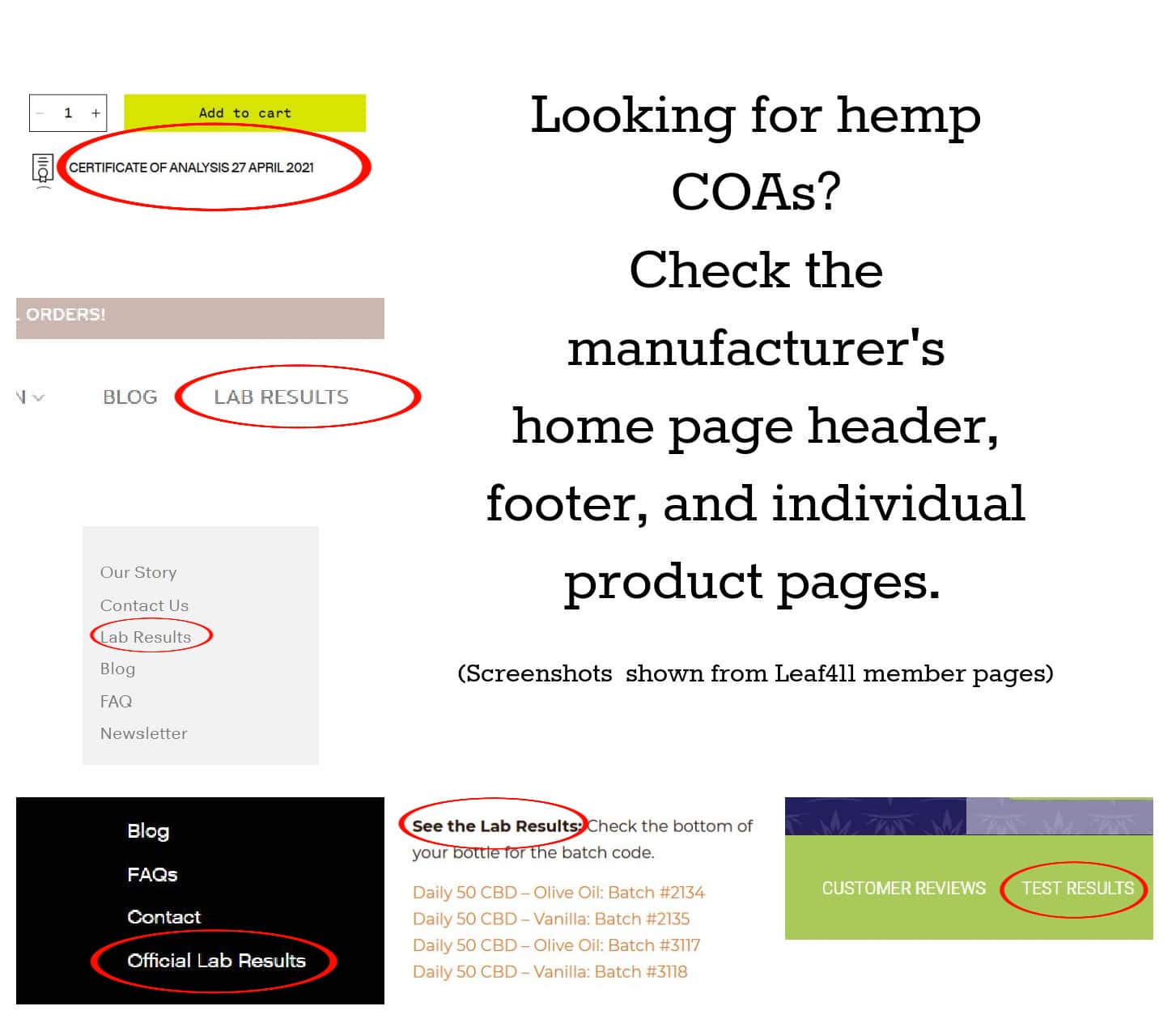
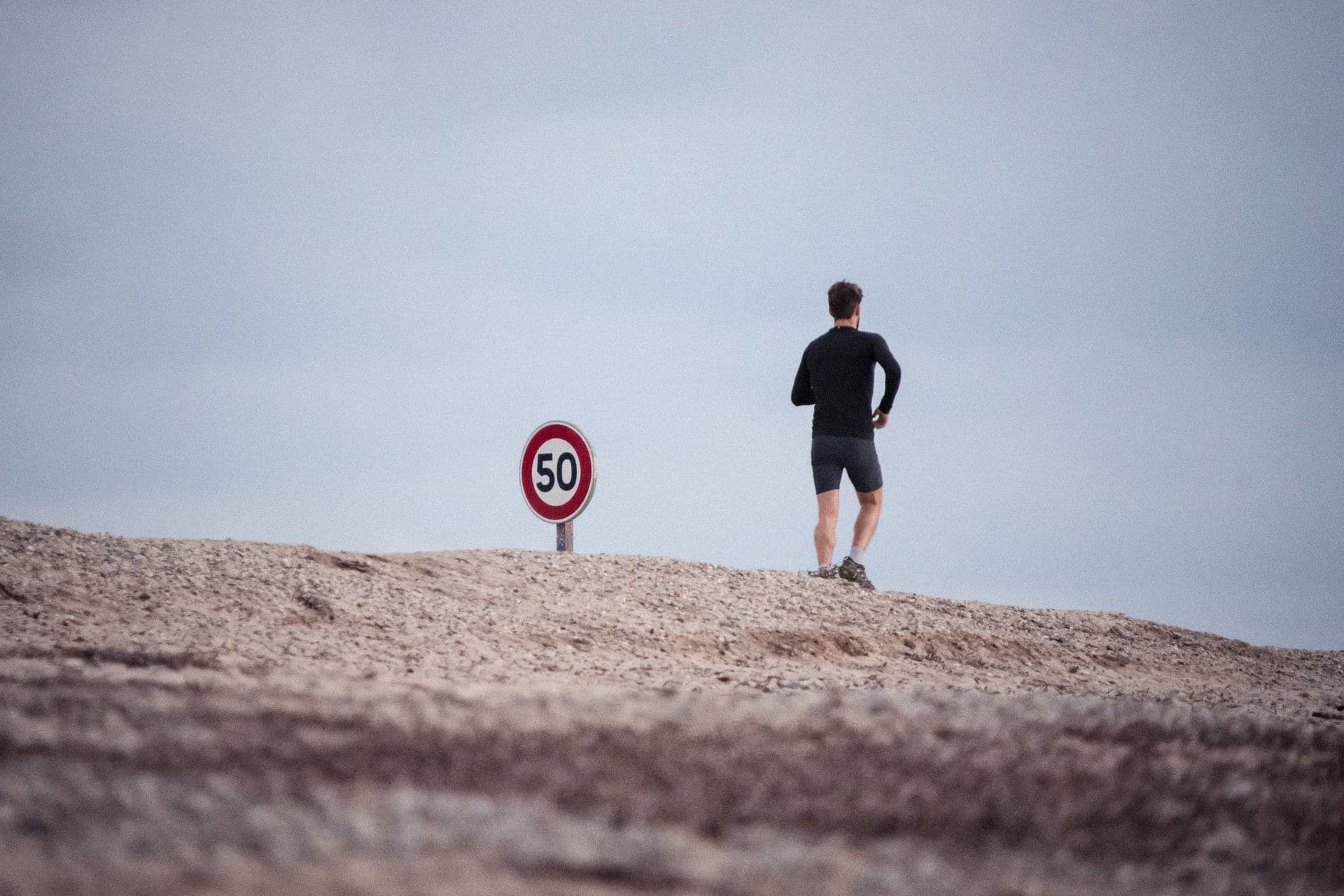
What are your workplace drug testing policies?
We’ve talked a lot about the CBD and THC cannabinoids in full-spectrum hemp, and how THC-COOH metabolites are stored in the body. Now, let’s turn to the urinalysis drug testing process, a topic we’ve written about before, but geared more toward marijuana users.
Most workplace drug tests, as well as the federal Department of Transportation (DOT), use a 50ng/ml limit for presence of THC-COOH metabolites. Hit that number or any higher, and you will fail the test.
In fact, drug testing laboratories are even able to test urine for lower levels of THC-COOH metabolites, at either a “sensitive” level of 20ng/ml, or an “extra-sensitive” level of 15ng/ml.
Is it possible for regular, responsible full-spectrum hemp use to put someone over the 50ng/ml limit? Based on recent calls to our hotline, we believe so.
Leaf411’s guidance for hemp CBD users who are subject to drug testing
- Be proactive. Take a look at your daily hemp CBD regimen, including all tinctures, gummies, beverages and other products you use to get an approximate idea of how much THC you might be ingesting or inhaling on a daily basis. As we mentioned before, though THC amounts are small, they can build up over time.
- When looking at the hemp CBD products you use (including those that claim to be THC-free), check if the manufacturers provide their COA lab results online on their website. COAs provide an extra level of assurance that the company is committed to transparency and high quality standards, though it’s not an absolute guarantee due to variations in lab testing techniques.
- Find out your workplace’s drug testing policies, as well as what sensitivity they test at. If you have a pending test scheduled at a lab, you can contact the lab directly to confirm what level they will be using. As we mentioned before, 50 ng/mL is the most common level employers use.
- Consider doing your own home drug testing with plenty of time before you face any potential workplace drug tests. We suggest utest which offers marijuana drug tests at different sensitivity levels, including 15 ng/mL, 20 ng/mL, and the standard 50 ng/mL, so that you can prepare based on what you know about your workplace’s testing policies.
- If you find that your current hemp CBD use triggers a positive THC drug test result, you may want to consider either taking a break from hemp CBD altogether, or switching to broad-spectrum or isolate products which should be THC-free. Of course, you’d want to repeat your home test in a few weeks to ensure your levels of the THC-COOH metabolite have gone down.
- For nurses and other healthcare workers: Consider sharing the ACNA position statement on workplace drug testing with your organization (click this link to download). Alternatives exist to more accurately test on-the-job impairment.
Keep in mind that our Leaf411 hotline nurses can help guide you in this process, at no cost to you. Call 844-LEAF411 (844-532-3411) or chat us from our home page during hotline hours, Monday-Friday from 8:00 a.m. to 7:00 p.m. MDT.
The Leaf411 cannabis nurse hotline provides free, anonymous education and directional support to the general public about the safe use of legal cannabis. We partner with select business members who meet our rigorous standards to extend our education and outreach efforts.

